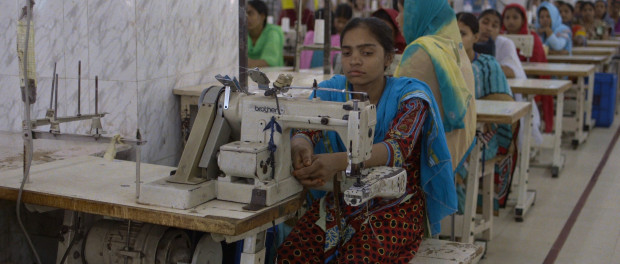‘The True Cost’ of Fast Fashion
It’s cheaper than ever to shop from stores like H&M and Zara, where a trendy dress or sweater might set you back less than a meal at McDonald’s. But the ‘savings’ achieved here are purely an illusion. The practices by which we actually obtain both the fabric and the workmanship needed to put together these garments come at a staggering environmental and human cost.
The True Cost, directed by Andrew Morgan, is a new documentary that shows the physical, energy-intensive side of the “fast fashion” industry. The film stresses the fact that current practices need to change if we really want clothing made in a way that is safe, ecologically-friendly, and supportive of working families. To prove this point, Morgan and his crew head to factories and locations throughout the world, speaking with everyone from labourers to clothing company CEOs.
Today the apparel industry’s environmental impact is more substantial than ever before. According to Direct Energy, clothing manufacturing alone accounts for approximately 10% of all global carbon emissions, and stands as the second-largest industrial polluter – next to (surprise) Big Oil. Polyester fabric, one of the most commonly used textiles today, needs nearly 70 million barrels of oil each year to produce but takes 200 years to eventually decompose. On average, each individual American throws away 70 pounds of clothes annually.

The True Cost
Morgan takes us to Bangladesh, a country that relies primarily on dirty coal fuel for its electricity. Here, factories are plugged into a heavily-polluting power grid to make garments that are typically worn by consumers just seven times. More often than not, textile workers barely make a living wage, while putting their lives at risk simply by showing up for work: several accidents at factories in this country have claimed more than 1,000 lives each time. Because these types of unsafe factories compete heavily with each other for contracts, there’s little room to raise wages, and union activity is strongly discouraged. Some “employees” are young enough to still be in primary school – the filmmaker doesn’t gloss over the cruel irony of the fact that these children toil all day to manufacture garments intended for peers their own age, oblivious and unknowing of their plight.
Clothing customers can drive change in this area by refusing to comply with the ethos of constant consumerism and a mindless drive for novelty. By carefully considering every purchase and only buying those items that you think you’ll wear many times, you’ll be reducing demand for a never-ending cycle of cheap, poorly made items. Shopping at thrift stores is another way of making a difference: every used garment resold to someone else represents one less piece that will clog our landfills.

The True Cost
Green-friendly clothing brands are taking steps to address these problems. Kering and H&M are investigating newfangled recycling technology that will enable them to reuse thrown-away textiles. Zara, Walmart and hundreds of other clothing firms have promised to improve workplace safety in overseas factories. There’s also a growing awareness of the benefits of renewable energy. Stella McCartney, daughter of Beatle Paul McCartney and a high-end fashion designer, powers her U.K.-based facilities exclusively with renewable sources of power.
Retailers continually push us to buy more pieces of hastily assembled, inexpensive apparel. Yet those who tune into The True Cost will see how cruel this capitalist market-driven system really is. Only by altering our purchasing habits will we be able to alter these harmful practices, so be sure to think twice before investing in any new additions to your closet.
The True Cost is available to watch on Netflix.






